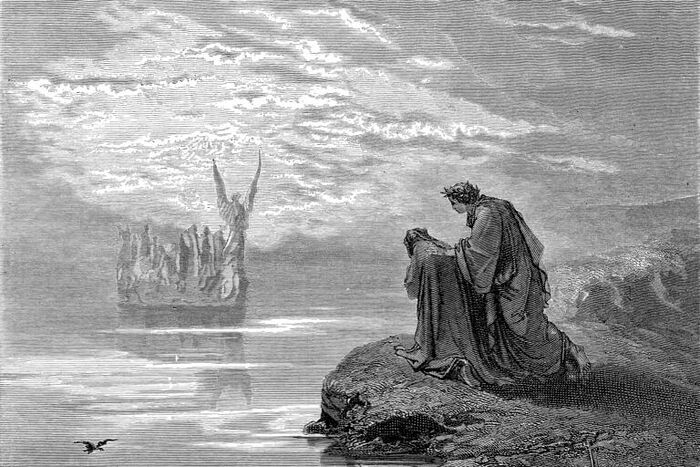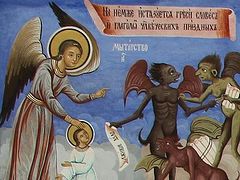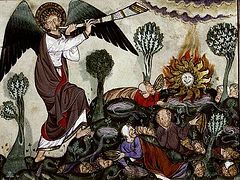“After the general resurrection we will meet with our kin and friends. This long–awaited meeting and the life of the age to come is the fundamental hope of Christians. This is how we console ourselves after the deaths of our loved ones. But after the Last Judgment not everyone will inherit the Kingdom of God. How can those who enter eternal life be blessed knowing that after the long-awaited meeting some of their loved ones will be condemned to everlasting suffering in fiery Gehenna?” This is an extract from a letter that came to the editors of the website of the Moscow Sretensky Monastery. Its regular contributor, Priest Alexei Taakh, rector of the Church of St. Sophronius of Irkutsk in Novokuznetsk (the Kemerovo region), has kindly agreed to reflect on this subject.
What is the fate after death of those who did not accept Christ, remained pagans or atheists? None of those living today can answer this question, because no one returns from eternity. Of course, there are testimonies of those who returned after clinical death. Many do not remember anything at all: darkness, ringing in the ears, and then they woke up in the hospital. Others say that they were outside their bodies. We know from them in particular that a person sees his body from the outside and can remember in detail about what was happening around: what people were there and what they were doing. We also know from these testimonies about the light at the end of a tunnel.
But the continuation of these testimonies always differs. Some communicated with their reposed kin, others talked with their guardian-angels, others were shown Paradise and hell, and these descriptions always vary for different people. Some see different moments of their lives—a kind of “debriefing”. After passing through that tunnel everyone is given individual images and individual information—apparently those needed by a particular person or his loved ones for their salvation. Many people also talk about the feeling of incredible lightness and how unbearably heavy our material bodies are in comparison with this lightness.
Many skeptics argue that these images are created in the brain, like dreams, so there is no point in believing them. But it should be taken into account that dreams are always based on our experience. We see in our dreams what we live by: our environment, work, home, school, acquaintances, desires and fears. But the testimonies of those who underwent clinical death always begin the same way.
Such testimonies exist today, and they were hundreds of years ago. People who lived and live in different countries and cultures; people of different faiths and non-believers; people of different social strata: from beggars to monarchs’ families; different people with different experience, aspirations and surroundings had the same beginning of their near-death experience: flying outside their bodies and a tunnel with light at the end. It’s too much the same for mere dreams.
However, these witnesses give no answer to the question asked. What was shown to them was individual for each of them. We can conclude from this that the beginning of the afterlife is the same for everyone, regardless of where and how a person lived.
We can learn about what happens after death from only one source—the Holy Scriptures. Although there is not much information on this subject. In many ways, the veil of the mystery of the afterlife was revealed to us by Christ. But again, it was not an encyclopedic description of what happens there. The Lord spoke to His disciples in the language of images and parables so that they could understand the essence and the laws. Therefore, all detailed descriptions in the media culture of Paradise as a resort on an island, and of hell as a concentration camp, where demons-overseers torture sinners in refined ways, are just fantasies.
In the question that came to the editors, the concept of “Gehenna” appears. Actually, this is what Christ called the fate after death of those who would not enter the Kingdom of Heaven. From here many artists and animators draw their inspiration and depict hell as a space inside a volcano, where fire burns all around, with melted stones, boiling cauldrons and red-hot chains everywhere and demons roasting sinners on these infernal attributes, as if they had a summer holiday there perpetually.
 Gustave Dore, The Gate of Hell
Gustave Dore, The Gate of Hell
But it should be understood that Gehenna is the geographical name of a narrow and rather deep ravine in the south of Jerusalem. Ancient pagans offered human sacrifices here, and then this place became the city’s garbage dump. In order to get rid of the smell of rot and prevent the spread of diseases a fire burned there permanently. So Gehenna became known as fiery Gehenna.
Christ was probably not the first to compare hell with Gehenna. There are suggestions that this literary metaphor was in use in Judea and the Lord only used an image known to common people for a clearer explanation of His teaching. And whosoever shall say to his brother, Raca, shall be in danger of the council: but whosoever shall say, Thou fool, shall be in danger of hell [“Gehenna” in the Russian Synodal translation] (Mt. 5:22). Here He did not go into explanations of what Gehenna was because everyone already knew what it was about.
The image of fire can be found many times in the Bible. Then shall he say also unto them on the left hand, Depart from me, ye cursed, into everlasting fire, prepared for the devil and his angels (Mt. 25:41). And if thy foot offend thee, cut it off: it is better for thee to enter halt into life, than having two feet to be cast into hell, into the fire that never shall be quenched: where their worm dieth not, and the fire is not quenched (Mk. 9:45–46).
We should also recall the parable about the righteous Lazarus. And he cried and said, Father Abraham, have mercy on me, and send Lazarus, that he may dip the tip of his finger in water, and cool my tongue; for I am tormented in this flame (Lk. 16:24).
The Lord also used other images to describe the afterlife of the righteous and sinners; for example, a feast where everyone rejoices. But those who were found unworthy were driven away from the feast. Then said the king to the servants, Bind him hand and foot, and take him away, and cast him into outer darkness, there shall be weeping and gnashing of teeth (Mt. 22:13).
It is clearly shown here that the torment of sinners is not so much physical as moral; the agony of not being able to rejoice with everyone and regret that they had a chance.
I really like the image shown at the end of the Chronicles of Narnia by C. S. Lewis. At the end of Narnia all beings passed through a door into a new life (it symbolized afterlife). Then, when approaching Aslan (an allegory of Christ) everyone became either light or dark. The main characters saw beautiful scenery and smelled wonderful scents—in a word, found themselves in Paradise. But their antagonists were terrified and wept, being in the same place, because they saw only darkness and dampness, smelled a terrible stench and so on. When the main characters tried to show them that everything around them was extremely beautiful, Aslan stopped them with approximately these words: “They are so filled with evil that they cannot perceive this place otherwise.”
I tend to think that hellfire and eternal torment are not literal, but symbolic of what will actually happen. I have two reasons to think so.
First, we perceive burning in a flame as bodily suffering, full of physical pain. And many movies, cartoons or paintings on this topic show us hell as a place of physical pain and tortures: fires, cauldrons, frying pans and flames, flames, flames. But in order to feel physical pain you must have nerve endings that the material body has. As we know, in the afterlife the soul lives separately from the body. It is immaterial and cannot experience physical pain, but it can have emotions. I believe that the torment of hell is suffering from the awareness of the fact that you have missed your chance to be in the love of God. Which is exactly what the parable about the feast and the outer darkness is about.
 Gustave Dore, The Boat of Souls
Gustave Dore, The Boat of Souls
Secondly, we know that God is love (1 Jn. 4:16), that He is merciful and wants everyone to be saved, so the idea that God created such a “concentration camp” for eternal and cruel torture of sinners is nonsense. He is Love, He came down into our world and suffered for us; He taught love and forgiveness… And then He suddenly turned into a ruthless executioner and tortures His children everlastingly as punishment for several years of sinful life? It is nonsense.
Hell did not appear as a place of torment—not for this purpose at all. When the first angel—Lucifer—and his followers renounced God and turned against Him, they changed at the level of their nature. If God is love, then they have become the personification of hatred for Him and the whole of His Creation, including for themselves. Angels live in the love and grace of God, but demons suffer from this love and grace. Have you ever seen possessed people “twisting” around in the church? Here it is—this torment! Hell is a place (if such a concept is applicable to the immaterial realm) where there is almost no grace of God. Fallen angels don’t suffer so much there. Hell was allowed by God out of love for His, albeit fallen, Creation, so that they may have a place to exist.
And I believe that the torment of hell is not a torture chamber, but the torment in their feelings of those who have renounced God: despair, anger at themselves and others, hatred, resentment and envy. All that they filled themselves with in their lifetime. Like those characters from C. S. Lewis’s Narnia. And they are in hell only because getting closer to God’s love and Paradise is even greater torment for them.
Let’s return to the main question of this article: How can those who inherit eternal life be in blessedness knowing that after the long-awaited meeting, some of their kin will be condemned to fiery Gehenna?
The desire for good to your loved ones, and therefore a better fate for them, is natural for everyone. But if a person has renounced God and passed away in despondency, anger and other sins, then staying in hell, where he will not suffer so much from Divine grace, will be the lesser evil for him.
However, we have hope for a change in their fate after death. I’m talking about prayer and almsgiving. We pray for the baptized at church services that the Lord will forgive their voluntary and involuntary sins and give them rest with the saints; and we pray for the unbaptized and suicides privately at home. And also for the repose of both we can give alms with prayer requests to beggars, churches, our acquaintances and relatives (hence the tradition of giving out sweet food at funerals to all who have come to remember the deceased in their prayers).
By the way, Protestants deny that prayer can change the fate of people after death. They are guided by the fact that in the above-mentioned Parable about the Rich Man and Lazarus nothing is said about the possibility of salvation for the reposed rich man. And they refer to a few other points—for example, where it says that the departed belong to God, that the way they lived their lives will be judged and so on (cf. 2 Cor. 5:10; Rev. 14:13; Rom. 4:8). They interpret it in such a way that after death, the state in which a person died is fixed (the Orthodox agree with this); and they also claim that this state is forever and it is impossible to change it (here we disagree).
And the cherry on the top of the Protestant cake is the quote from Deuteronomy: Or a charmer, or a consulter with familiar spirits, or a wizard, or a necromancer. For all that do these things are an abomination unto the Lord: and because of these abominations the Lord thy God doth drive them out from before thee (Deut. 18:11-12).
They claim that a “necromancer” is he who prays for the repose of the dead, which means it is a sin and an abomination before God. But what about the context? After all, it mentions all sorts of sorcerers and magicians. In my opinion, along with magic, fortune-telling and necromancy, Spiritism (where the dead are asked questions) is meant here, and not prayer to God for the departed. We do not ask questions to God or the dead when we pray for their repose. And why is the Last Judgment needed after the particular judgment (which is immediately after death) if the fate of all the departed has already been decided? But it will take place—the Lord spoke about it.
Here are some Orthodox answers.
Praying always with all prayer and supplication in the Spirit, and watching thereunto with all perseverance and supplication for all saints (Eph. 6:18). Here the Apostle Paul does not divide saints (i.e. Christians) into the living and the dead, but instructs us to pray for all saints.
The Lord grant unto him that he may find mercy of the Lord in that day (2 Tim. 1:18). This is the prayer of the Apostle Paul for Onesiphorus, who was dead by that time.
Or, for example, prayers for the dead in the Old Testament: O Lord Almighty, the God of Israel, hear now the prayer of the dead of Israel, and of their children, that have sinned before Thee, and have not hearkened to the voice of the Lord their God, wherefore evils have cleaved fast to us (Bar. 3:4).
There are many such places in the Bible. And, by the way, the Jews, like us, had and still have a tradition of giving alms for the dead. What is it if not the hope for God’s mercy that through our love and prayers the fate of our kin after life will change after the Last Judgment?
Therefore, the answer to today’s main question will be a call to prayer. In order not to grieve over the sad fate of our dead, we should show our love and hope in prayer here on Earth. Pray, ask others to pray, and show mercy to the poor, to the churches, and to your neighbors.







